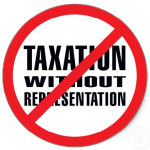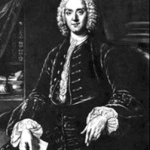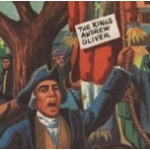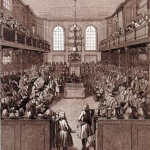Articles in the British Taxation in Colonial America Category
British Taxation in Colonial America »

The Navigation Acts were trade rules that governed commerce between Britain and its colonies. The first of the Navigation Acts existed for almost two centuries and was repealed in 1849. The laws were designed to protect British economic interests in colonial trade and to protect its industry against the rapidly growing Dutch navigation trade.
The purpose of the Molasses Act was to protect British West Indies exports to the American colonies from the more fertile French and Spanish islands of Martinique and Santo Domingo. It was not designed to raise revenue …
British Taxation in Colonial America »

During the first eight years of King George III reign the British government had six ministries. British politics was in a state of chaos and political infighting between Whig groups disrupted colonial policy.
In the last years of King George II, Britain was unified under the leadership of William Pitt who had led Britain to war against the French in North America and India. The war had been costly and Britain was highly indebted however Pitt wanted to declare war on Spain before Spain attacked Britain. Not finding support among George …
British Taxation in Colonial America, Stamp Act »

Up until the attempt to collect the Stamp duty colonists had accepted minor duties on trade such as the , and even the . cost more to administer than it collected in revenue. Those measures were not considered as “tax” by the colonial assemblies but as trade regulations that compensated for protection, access to foreign products and a foreign market for American goods.
Colonists were careful to draw distinction between internal and external taxes. Internal taxes were those imposed by the provincial government, members of which were elected by residents, …
British Taxation in Colonial America, Stamp Act »

Proponents of an American Stamp Duty were found on both sides of the Atlantic but most supporters were in Britain. One of the most vocal British opponents on the American tax was William Pitt, the Earl of Chatham, who led Britain to victory during the French Indian War. Edmund Burke, a statesman and philosopher, strongly opposed the tax and supported American independence. Most merchants also opposed taxation.
British expenditure during the French Indian War almost doubled Britain’s debt. During that period the government borrowed heavily, about four-fifth of the total amount …
British Taxation in Colonial America, Timeline of British Acts on America »

During the early seventeenth century Britain created a mercantile system to maintain close control and regulate trade of its colonies, they tried to make sure all revenues generated from the trade with its American colonies went back to the crown. This system did not allow its colonies to freely trade with other countries other than Britain. The first of its protective measures was the The law was designed to protect British economic interests in colonial trade and to protect its industry against the rapidly growing Dutch navigation trade, it …


